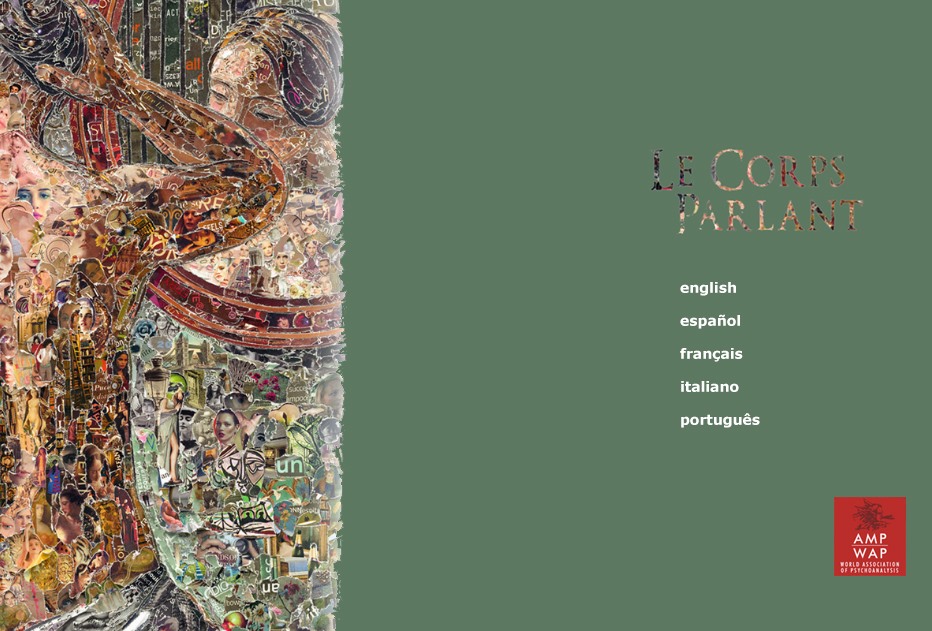

THE SPEAKING BODY
Xth Congress of the WAP,
Rio de Janeiro 2016
525
524
Wülfing, Natalie.
Prada Suits Everyone, No Women in the 21
st
Century
[LCE 2(6), 2013]
“Lacan goes on to say that sex is as impossible as it always was, no utopia, or
ideal of non repression or free sex will solve this problem because it is a logical
problem, not one based in the unconscious—the latter being solvable to an
extent.
From the Freudian ‘what does a woman want?’ singled out by Lacan, to the
notion of there being no representation of woman in the unconscious other
than as mother—we are in the realm of an absence, a semblant.”
p. 4
Zenoni, Alfredo.
Orienting Oneself in Transference
(2006). Trans.: F.
Coates Ruets, [PN 26, 2013]
“Lacan always wanted to underline what was actually in transference: the
actuality, for example, of the symbolic relationship between the subject and the
Other, as opposed to the imaginary relationship in which past relationships,
those of childhood, are supposed to reproduce themselves; actuality in what
the subject demands of the Other from the simple fact of speaking to him:
demand of love; actuality in the unconscious satisfaction of the drive that the
analysand draws from the very experience of analysis. All in all, transference is
conceived of by Lacan as being first of all an ‘enactment’ of a present structure
(demand for love, fantasy, ‘unconscious reality’), and not as a repetition of the
past. In psychosis also, transference is an enactment, only the structure of what
is enacted switches around.”
p. 113
“Lacan isolates, with the notion of jouissance, that which in ‘libidinal’
satisfaction does not come from animal experience but characterises, on the
contrary, an experience that is specifically submerged, for better or worse, in
languages and civilisations.
Now, this jouissance, tied to the speaking condition of the human being, may
meet one of two destinies, or take on one of two statuses. In one case, it is
effaced, negativised, or, according to another version, impossible. Its cancellation
or its perdition then operates in the form of ‘lost objects’ or objects a, as the
cause of a movement of searching and recuperation which gives to human
experience, as observed in the clinic, the allure of a recurrent miscarriage.”
p. 114
IV /c. Speaking-Body
Bassols, Miquel.
Language as a Disorder of the Real
. Trans.: V.
Woollard [HB 10, 2013]
“The logical paradox that this affirmation supposes, when the brain is taken
as separate and even different from the body itself, is not a barrier against the
attempt to write the sexual relation in the real. The fragmented body of the
subject of science can always dream of recomposing itself in virtual space with
the Other, in so far as he, or she, is able to incarnate or pretend to be an Other
jouissance that is always possible.”
p. 104
Briole, Guy.
A Pound of Flesh
. Trans.: J. & J. Haney [HB 11, 2014]
“In paying the price, the ‘pound of flesh’, demanded by the analyst, the body
found itself from the outset at the heart of the process—in analysis, one could
say. The handover to which the analysand consented, made him appear marked
by the loss, by the cut, revealing to the subject his division, and opening him to
putting the unconscious to work.”
p. 159
Brousse, Marie-Hélène.
Feminine Know-How Concerning the
Relation: The Three ‘R’s: Ruse, Ravaging, Ravishment
. Trans.: A.
Alvarez [LI 36, 2010]
“Would ravishment then be the choice of making oneself a body with the
symbolic, disappearing by soldering oneself to it?”
p. 114
Brousse, Marie-Hélène.
Feminine Homosexuality in the Plural, or
When Hysterics Do Without their Straw Men
. Trans.: S. Seth [HB 9,
2012]
“Of what ‘not-all’ would female homosexuality be, for its part, the indicator? Of
‘not all sex’, we propose. It would be a solution that would come to limit sexual
meaning, not in the way in which psychoanalysis does it with ‘there is no sexual
relation’, but in raising the flag of love: a kind of sublimation by the soul. In the
desert of the absence of sexual rapport that does not come any more to veil the
father and the exigencies of the family order, it would be an attempt to make
exist, by the writing on the body, the event of a jouissance localised outside the
sexual organs. (…) a homosexuality, ‘not all’, not in the sense of incomplete,
but as non-totalitarian, which thus cannot be a factor of identification, nor of a
lifestyle.”
p. 196
Dessal, Gustavo.
The Spark of a Desire Can Transform a Subject, a
Community, a Country
. Trans.: H. Rouse [HB 11, 2014]
Authors of the Freudian Field



















